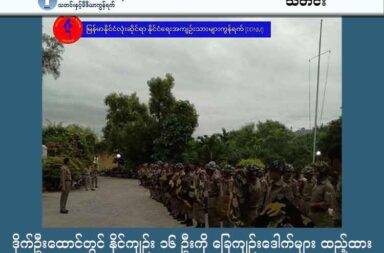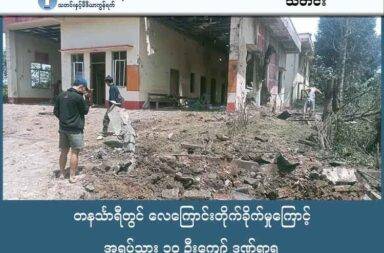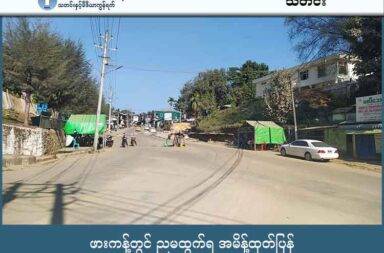‘The Truth Has Been Ignored,’ Kachin Org Says About Tatmadaw’s 2019 War Crimes
By NETWORK MEDIA GROUP (NMG)
Monday, January 13, 2020
In its most recent report, the Kachin Women’s Association – Thailand (KWAT) has said that the Burma Army has been met with impunity for its crimes and human rights abuses over the last year in northern Shan State.
KWAT, which recorded the cases of military violence throughout 2019, launched its rights report on January 7. In the report, they focus on cases where the Burma Army—or Tatmadaw—has failed to hold their own soldiers to account for crimes that they committed.
“Our report highlights human rights abuses committed by the army,” KWAT spokesperson San Htoi told NMG. “A military column arrived in a village and a woman was killed on the same night… Police didn’t investigate the case, but the Tatmadaw investigated it. There were no witnesses. It’s like the truth has been ignored.”
The case San Htoi referred to was that of Nan Htan, who was murdered—and believed to have been raped—in her home in Nam Soung Kyae village in Peing Pun village-tract of Kutkai Township on July 4, 2019.
At the time, some 40 civil society organizations in northern Shan State demanded that the authorities arrest the perpetrators as soon as possible, and take stronger considerations for women in conflict-affected areas. No one has been brought to justice.
Doi Leng, who works with the Legal Aid Network, said that people in northern Shan State are oppressed both through military occupation and unjust laws.
“The military movement of the Burma Army is a major factor threatening the security of local people living in conflict-affected areas. It’s especially threatening the security of women,” she said. “Under the government’s control area, the authorities have oppressed people with various laws including [by bringing] unfair lawsuits. These two things are big challenges for people in the two different areas.”
KWAT’s Seng Htoi said that the report pays specific attention to abuses that were perpetrated in August 2019. The Burma Army attacked Mawhis village in Kutkai on August 31, killing five civilians including three children. Three more civilians were injured.
“Children were killed. The Tatmadaw and ethnic armed organizations blamed each other. Who committed these human rights abuses? Nobody has taken action,” she said.
Another group that is mentioned multiple times is the Burma Army’s notorious Light Infantry Division (LID) 99, known as the military’s “shock troops.” According to KWAT, a man from Kutkai town was tortured by LID-99 on March 11, 2019; a man from Nawng Hai village in Kutkai town was tortured by LID-99 and Infantry Battalion 45 on March 8, 2019.
There are also outstanding cases of murder which have never been resolved. KWAT reported that two Kachin volunteer teachers were killed in Kawng Hkar village in northern Shan State in January 2015. Kachin woman Sumlut Roi Ja was abducted and is believed to have been killed in October 2011 by Tatmadaw troops in Kachin State.
The absence of justice in these cases is attributed to Burma’s failed judicial system, and a fear within that system of prosecuting the Burma Army.
San Htoi pointed out that these crimes stand in sharp contrast to the testimony that de-facto head of state State Counsellor Aung San Suu Kyi delivered at the International Court of Justice (ICJ) in The Hague in December about war crimes committed by the army during hearings on genocide in Burma.
“Daw Aung San Suu Kyi said that the army didn’t commit human rights abuses, [or] that even though the Burma Army committed abuses, the army had discipline. In practice, human rights abuses occurred in conflict-affected areas in ethnic regions. There is evidence for every human rights abuse case, but the authorities fail to seek the truth,” San Htoi said. “Daw Aung San Suu Kyi’s speech at the ICJ and the actual happenings on the ground are completely different. The Burma Army has failed to seek the truth about human rights abuses.”
KWAT recommended that the Burmese government, military and the ethnic armed organizations cooperate for the security and safety of people. KWAT also demanded that the Burma Army cease all military operations and begin a political dialogue toward the establishment of a new federal Constitution in the country which would guarantee equality and justice.


